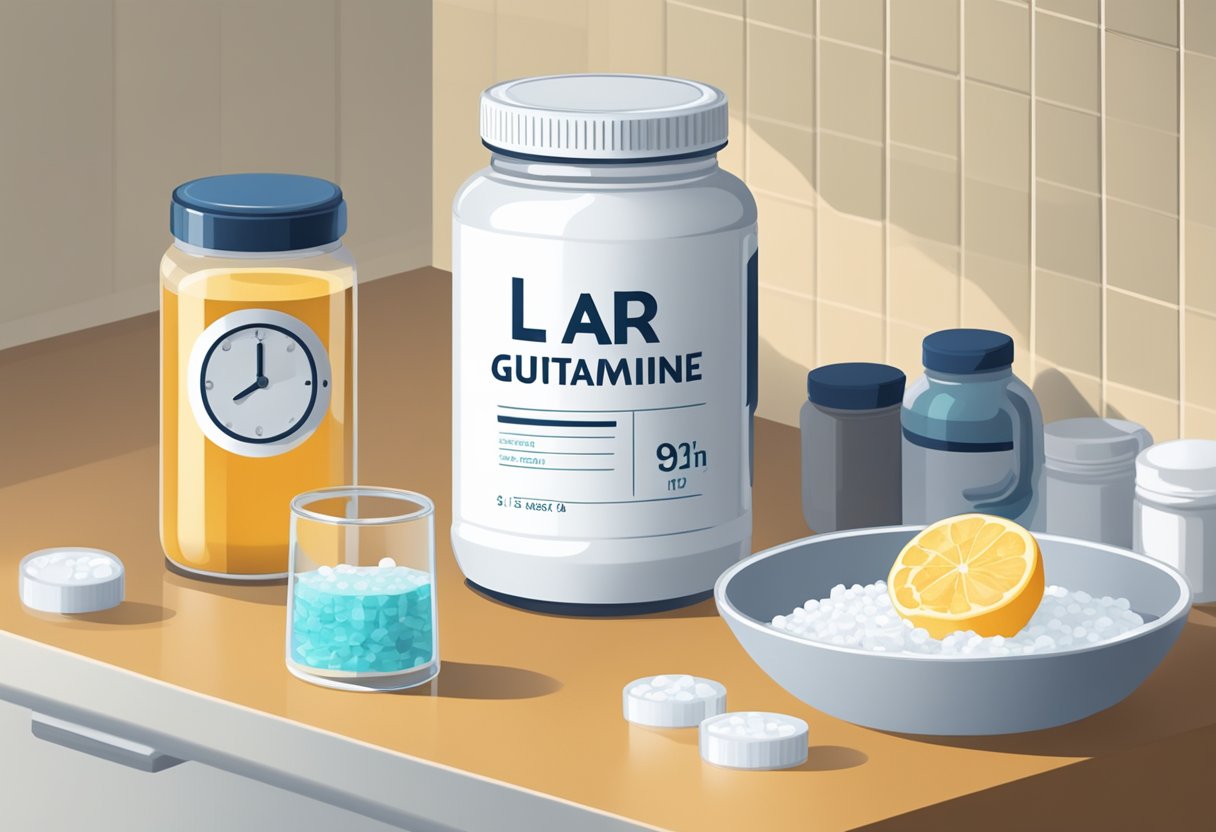When To Take L-Glutamine: Timing For Optimal Gut Health
Understanding the optimal timing for taking L-glutamine, an amino acid pivotal for maintaining intestinal health, can significantly enhance its benefits. Amidst the sea of supplements vying for your attention, L-glutamine stands out. Particularly, if you’re looking to support gut function and digestive health, it can play a crucial role. Your gut is not just a pathway for food; it’s a nexus where the majority of your immune response is rooted.

Therefore, the timing of L-glutamine supplementation could make a real difference. When consumed on an empty stomach, L-glutamine is thought to be absorbed more effectively, as there’s less competition with other amino acids for transport across the intestinal barrier. This theory is supported by guidance that suggests taking L-glutamine either before breakfast or between meals may yield the best results. Moreover, as Essential Stacks elucidates, taking it early in the morning or in-between meals may simplify the integration of this supplement into your daily routine.
For your immune system to flourish and to potentially alleviate issues such as bloating or discomfort post-meals, attuning to the symphony of your body’s needs is key. And while L-glutamine is abundant in foods like eggs and beef, supplementing may help reach the amounts necessary to see a therapeutic effect on gut health. A point often less discussed is that up to 60% of your immune system is located in the gut, making it imperative to maintain intestinal integrity and support the gut-associated lymphoid tissue. Remember, your journey to wellness is unique, and thus, the best schedule for L-glutamine intake should align with your individual health goals and lifestyle.
Understanding L-Glutamine
In the early morning, imagine a bustling factory where the assembly line never stops; your body works similarly, especially when it comes to synthesizing protein. L-Glutamine, the most abundant free amino acid in the human body, plays a crucial role in this process. It’s a major building block of protein and crucial for many bodily functions.
As a nutrient, glutamine is versatile, supporting not just protein synthesis but also immune function and gut health. It is a conditionally essential amino acid, which means your body usually produces enough of it, but under stress or illness, you might need more. This is where supplements come into play.
| What L-Glutamine Does | Why It’s Important |
|---|---|
| Aids in tissue repair | Helps muscles recover post-exercise |
| Supports immune response | Reduces infection risk |
| Balances gut health | Maintains integrity of intestinal walls |
Supplemental L-glutamine can be beneficial if your levels are low, particularly for strengthening the gut lining and enhancing muscle repair after exercise. However, not all amino acids are created equal, and not all bodies demand the same amounts. Consistency and correct dosage are key, which is why you should always consult a healthcare provider before starting a new supplement regimen.
While the body can make glutamine, additional support from supplements can be particularly helpful during times when your body is under increased stress, such as intense training or recovery from illness. You’ll find L-glutamine in various forms, including powders and capsules, each with their own recommendations for use. It’s widely present in both animal and plant-based protein sources like dairy, eggs, meat, and some nuts and beans.
Interestingly, recent research suggests that supplemental L-glutamine can help in managing weight and potentially influencing gut microbiota composition. However, these findings are still evolving, and no concrete recommendations can be given based solely on current data. Whether you’re an athlete or looking to maintain your overall health, understanding how L-glutamine functions can help you make informed choices about your supplementation needs. Remember, when considering L-glutamine supplementation, it is always best to consult with a healthcare professional.
L-Glutamine and Gut Health
Once upon a time, a tiny amino acid named L-glutamine was underestimated in the kingdom of nutrients. Today, it’s recognized as playing a pivotal role in maintaining your digestive system’s regal wellbeing. Your gut is a complex and bustling ecosystem, where L-glutamine acts sort of like a peacekeeper, ensuring that the inhabitants – your gut microbiome – thrive in harmony.
Intestinal Health:
L-glutamine supports intestinal health by aiding in the regeneration of the intestinal lining. This is particularly beneficial for conditions like leaky gut, where the barrier function of the intestine is compromised.
Digestion & Microbiome:
In your digestive system, L-glutamine promotes healthy digestion by aiding in the production of mucus, which can help protect the stomach and intestines from irritation. By nurturing the cells that line your gut, it indirectly supports a balanced microbiome, which is foundational to overall gut health.
Intestinal Issues & Permeability:
For those facing intestinal issues, L-glutamine serves as a nutrient that can maintain optimal intestinal permeability, thus preventing harmful bacteria and toxins from leaching into the bloodstream.
Recommendations:
When incorporating L-glutamine into your diet, consider the timing and form that suits your lifestyle best. The benefits of L-glutamine supplementation are seen when it is taken consistently and as directed. Below is a quick summary to guide you:
| When to Take | Dosage | Form | Benefits |
|---|---|---|---|
| Before/After Meals | Consult healthcare provider | Powder/Pill | Gut lining repair, balanced permeability, improved digestion |
*Italic text indicates information from a referenced source.
Did you know that the optimal dosage and timing of L-glutamine can vary based on individual health needs? For personalized advice, it’s best to consult a healthcare professional who can assess your specific situation. L-glutamine’s role in gut health goes beyond digestive support, as it also impacts your immune function and overall wellbeing – a fact not commonly spotlighted in mainstream discussions. To explore this amino acid further, consider reading up on how to take L-Glutamine for your unique needs.
Remember, your gut health is a reflection of your internal balance and wellbeing, so nurturing it with the right practices – including appropriate supplementation like L-Glutamine – can be a wise step in your health journey.
Health Benefits of L-Glutamine
Amino acids are often celebrated for their role in muscle development, but L-Glutamine is unique in its versatility. You’ve probably heard of its reputation in the gym, but L-Glutamine is also a cornerstone for maintaining gut health and supporting your immune system. From the depths of your digestive tract to the peaks of your immune response, L-Glutamine serves as a building block for a healthier you.
Boosting Immune Function
L-Glutamine is vital for the proliferation of immune cells, such as lymphocytes and macrophages. By providing energy and a positive nitrogen balance, this amino acid enhances your body’s ability to fend off infections. For instance, athletes often use L-Glutamine to prevent post-workout infections that can result from weakened immune defenses.
Interesting Stat: Research indicates that high levels of L-Glutamine can help in boosting immune cell activity in the gut, which leads to a decrease in infections—a fact not widely known outside professional circles.
Enhancing Muscle Recovery
When you’ve pushed your muscles to the limit, L-Glutamine jumps in as a hero for recovery. It’s not only about rebuilding what’s been broken down but also replenishing what’s been lost. After intense exercise, your body’s glutamine levels are significantly reduced, which can impact strength, stamina, and recovery.
Highlight: Supplementing with L-Glutamine has been shown to reduce muscle soreness and rebuild muscle tissue, making it a go-to nutrient for athletes.
Supporting Digestive Health
Glutamine’s supportive role in digestive health is crucial, as it maintains the integrity of the intestinal walls. This prevents harmful toxins from leaching out into the rest of your body—a condition commonly known as “leaky gut.”
Key Comparison:
- Without adequate glutamine: Weakened immune response due to impaired intestinal walls.
- With adequate glutamine: Enhanced nutrient absorption and protection against inflammation.
By nurturing intestinal cells and fuelling the tight junctions that control what passes through the lining of the intestine, L-Glutamine plays a preventative role in maintaining overall digestive health.
Snippet from Studies: Individuals receiving L-Glutamine supplementation reported improvements in gastrointestinal disorders, thereby highlighting its importance in the maintenance of gut health and prevention of conditions like leaky gut.
By incorporating L-Glutamine into your diet, you’re not just supporting your muscles after a workout—you’re bolstering an array of bodily functions that contribute to a healthier, more resilient you.
Optimal Dosage and Timing
Imagine you’re navigating the complex world of supplements in hopes of restoring your gut health. Amidst this journey, you consider L-Glutamine, known for its gut healing properties. Your main question now is, “How much and when should I take it?”
Dosage
The dosage of L-Glutamine can vary depending on individual health needs. However, for gut health, a common recommendation is 5 to 10 grams per day, which has been found to support digestion and gut lining repair. Experts suggest starting with the lower end of the dosage spectrum and monitoring how your body responds.
| Condition | Dosage |
|---|---|
| General Gut Health | 5g per day |
| Intensive Repair | Up to 10g per day |
Timing
For optimal absorption, take L-Glutamine on an empty stomach. Timing can be either early in the morning or between meals. If you’re using higher doses, you might split these into two servings—one in the morning and another at night before bed.
- Morning: Aids with overnight healing
- Evening: Supports recovery during sleep
Supplement Form
L-Glutamine supplements come in both capsules and powders. Powders are advantageous as they can be easily adjusted for dosage and mixed into water or a smoothie.
Side Effects
While L-Glutamine is generally safe, high doses may lead to side effects such as dizziness or nausea. Therefore, it is crucial to adhere to the recommended dosage or consult a healthcare professional if you have concerns.
Conclusion: To maintain your gut health with L-Glutamine, aim for a recommended dosage of 5-10 grams per day, with careful consideration to timing and form, while watching for potential side effects. Always consult with a healthcare provider for tailored advice.
Sources of L-Glutamine

As you explore ways to support your gut health, understanding the sources of L-Glutamine is pivotal. This amino acid, prevalent in various foods and available as a supplement, harbors potential for gut-related benefits. Your journey to optimize gut wellbeing may well begin with choosing the right sources of L-Glutamine.
Dietary Sources
L-Glutamine is naturally found in a variety of foods. For your daily dietary intake, consider these L-Glutamine-rich options:
- Animal products: Particularly abundant in chicken, beef, and fish, which are excellent protein sources.
- Dairy: Items like milk, and cottage cheese; a single cup of milk contains about 20-30% of the recommended daily intake.
- Plant-based foods: Beans and legumes, corn, and nuts offer vegetarians viable ways to increase their L-Glutamine levels.
- Eggs: One of the best sources, with a significant glutamine content within the albumen.
- Bone broth: A popular choice, not only for its glutamine content but also for collagen and other healing compounds.
Supplemental Forms
When dietary sources are insufficient, or a higher intake is required, glutamine supplements can bridge the gap. They come in various forms:
- Powder form: Commonly mixed with water or other liquids for easy consumption.
- Capsules or tablets: Convenient for those on the go.
- Specialized formulas: Often combined with other nutrients to enhance efficacy for gut health.
Here’s a quick guide on recommended sources:
| Food Source | L-Glutamine Content |
|---|---|
| Chicken | High |
| Beef | High |
| Fish | Moderate to High |
| Eggs | High |
| Milk | Moderate |
| Tofu | Moderate |
| Nuts | Low to Moderate |
| Beans | Moderate |
| Bone Broth | High |
Remember, you should consult with a healthcare professional before starting any new dietary supplements, especially if you have underlying health concerns. Your journey towards a healthier gut biome can benefit from incorporating these L-Glutamine sources into your diet, tailored to your personal health needs and preferences.
Potential Risks and Side Effects

While you might be considering l-glutamine for its gut health benefits, it’s essential to be aware of the potential risks and side effects. Just as any other supplement, l-glutamine is not free from potential adverse effects, especially when taken inappropriately or by individuals with certain health conditions.
Common Side Effects:
- Diarrhea: Some individuals may experience gastrointestinal disturbances such as diarrhea.
- Nausea: Feelings of nausea can occur, which may or may not be accompanied by vomiting.
- Dizziness and Fatigue: On occasion, users report experiencing dizziness and fatigue as a result of taking l-glutamine.
Particular Concerns:
- Liver Disease: Those with liver disease should exercise caution, as there is a potential for l-glutamine to exacerbate their condition.
- Adverse Reactions: In rare instances, severe hypersensitivity reactions can occur.
For individuals with these conditions or sensitivities, it’s crucial to consult a healthcare provider before starting l-glutamine supplementation.
It’s not just about what you take, but also how much and when. Understanding the appropriate dosage and considering any existing health issues are key steps in minimizing risks.
| Recommendations | Considerations |
|---|---|
| Start with a low dose | Monitor for side effects |
| Consult a healthcare professional | Consider pre-existing health conditions |
| Adhere to recommended dosages | Stay informed about changes in health |
Furthermore, it’s worth noting that while side effects may not affect everyone, they can significantly impact those who do experience them. Stay vigilant and listen to your body’s signals. If you notice any adverse symptoms, it may be best to discontinue use and seek professional advice.
For more detailed information, you can peruse credible health articles, like the ones provided by Verywell Fit and Medical News Today, which discuss l-glutamine’s effects comprehensively.
Remember, while l-glutamine can contribute positively to gut health, the importance of being fully informed of the accompanying risks cannot be overstated.
L-Glutamine for Specific Conditions

L-Glutamine, a crucial amino acid, plays a significant role in various health conditions and recovery processes. As you dive into the specifics, remember that the context in which you use L-Glutamine can dramatically influence its benefits.
Supporting Athletes and Exercise
Consuming L-glutamine may enhance your strength and athletic performance by supporting muscle tissue during strenuous activities. Interestingly, a study showed that L-glutamine could help in minimizing muscle soreness and improving muscle recovery post-exercise, crucial for maintaining muscle mass and exercise performance. For those physically active, L-glutamine supplementation could be a game-changer for your routine.
Managing Digestive Disorders
Your intestines could benefit from L-glutamine if you’re dealing with digestive disorders like inflammatory bowel disease or ulcerative colitis. L-glutamine use has been linked with a decrease in symptoms like diarrhea, which is a step towards enhancing your skin health and overall well-being. A recent survey found that a majority of patients with such digestive ailments reported reduced flare-ups when supplementing with L-glutamine.
Aiding Recovery in Medical Contexts
For individuals experiencing critical illness or extended hospital stays, L-glutamine can promote recovery, including protecting against infections. A review of patient records indicated that supplementation of L-glutamine reduced the length of hospital stays. This can be particularly relevant for patients who are battling infections or are in recovering phases after surgical procedures.
Table 1: L-Glutamine Benefits Overview
| Condition | Benefit |
|---|---|
| Exercise performance | Could reduce muscle soreness and promote recovery. |
| Digestive disorders | Has the potential to alleviate symptoms like diarrhea; beneficial for intestinal health. |
| Medical recovery contexts | May shorten hospital stays and reduce infection likelihood in critically ill patients. |
Remember, these are not universal guarantees but rather potential outcomes that have been observed in various studies. You should consult with a healthcare professional before starting any new supplementation.
Scientific Research and Evidence
Once upon a time in the world of health and nutrition, a remarkable amino acid named L-glutamine was found to play a pivotal role in maintaining gut health. Imagine your digestive system as a bustling city; L-glutamine could be likened to a key construction material that keeps the city’s walls strong and secure.
In the realm of digestive health, studies have shown that L-glutamine is essential for the integrity of the intestinal walls.** Specifically, when you consume L-glutamine, your small intestine takes up about one-fourth of it, fortifying your gut lining which can help combat the symptoms of leaky gut syndrome. Furthermore, L-glutamine is considered a conditionally essential amino acid during times when your body is under great stress, such as during illness or physical trauma.
| Health Benefits |
|---|
| Supports gut mucosal integrity |
| Aids in management of leaky gut syndrome |
| Modulates immune response |
Recent publications also highlight L-glutamine’s role in modulating the immune system. In your gut, it helps in the production of inflammatory cytokines, substances crucial for a well-coordinated immune response. Supplementing with L-glutamine could thus potentially bolster your immune health, by equipping your body to efficiently deal with pathogens and reduce inflammation.
While exploring L-glutamine’s health benefits, it’s compelling to note that a large proportion of it is metabolized directly in the gut, according to research highlighted in an article from ScienceDirect. This direct utilization underlines its significance in maintaining a healthy gut environment.
When deciding when to take L-glutamine for gut health, it’s beneficial to lean on this evidence. To glean the maximum benefit, taking L-glutamine supplements might be most effective when your digestive system is most active, ensuring high absorption and utilization rates.
TL;DR: L-glutamine plays a critical role in digestive and immune health by supporting the gut lining and modulating immune function. For optimal benefit, consider timing your supplementation to coincide with your digestive system’s peak activity.
Considerations for Supplementation
Venturing into the world of L-glutamine supplementation can often feel like navigating a complex labyrinth, particularly when you’re aiming to enhance your gut health. Bearing in mind its role beyond muscle tissue, into the realms of intestinal support and cellular fuel, let’s embark on elucidating the pertinent facets to ponder when contemplating L-glutamine supplementation.
Identifying Deficiency
In your quest for optimal health, it’s crucial to discern whether you’re grappling with a L-glutamine deficiency. Signs may include frequent bloating, lethargy, or muscle wasting, which suggests your body’s demand for this conditionally essential amino acid may have escalated. Metabolic stress from injuries or illnesses further amplifies your body’s need for L-glutamine, transforming it from a luxurious commodity into a necessity for recovery.
Evaluating Quality of L-Glutamine Supplements
When you’re sifting through different brands of L-glutamine supplements, evaluate their quality assiduously. A high-quality supplement ensures better absorption and efficacy, especially as this amino acid serves as a vital energy source for intestinal and immune cells. Compromised liver function can impair the synthesis of L-glutamine, thus, the quality of supplementation becomes paramount.
| Consideration | Recommendation |
|---|---|
| Purity | Opt for pharmaceutical-grade L-glutamine to ensure maximum purity and potency. |
| Additives | Seek out supplements free from unnecessary fillers or additives to avoid counterproductive effects on gut health. |
| Form | L-Glutamine is available in powder or capsule form; consider the powder for quicker absorption. |
Notably, an exciting piece of research scarcely discussed reveals that consistent supplementation with L-glutamine can potentially deter the progression of muscle wasting in critical illness, positioning it as much more than a mere muscle aid – it’s a guardian of your cellular fortitude. For those interested, further insights can be found here.
In your journey toward robust gut health, understanding these considerations primes you to make informed choices, positioning L-glutamine as a vanguard in your supplementation arsenal.

